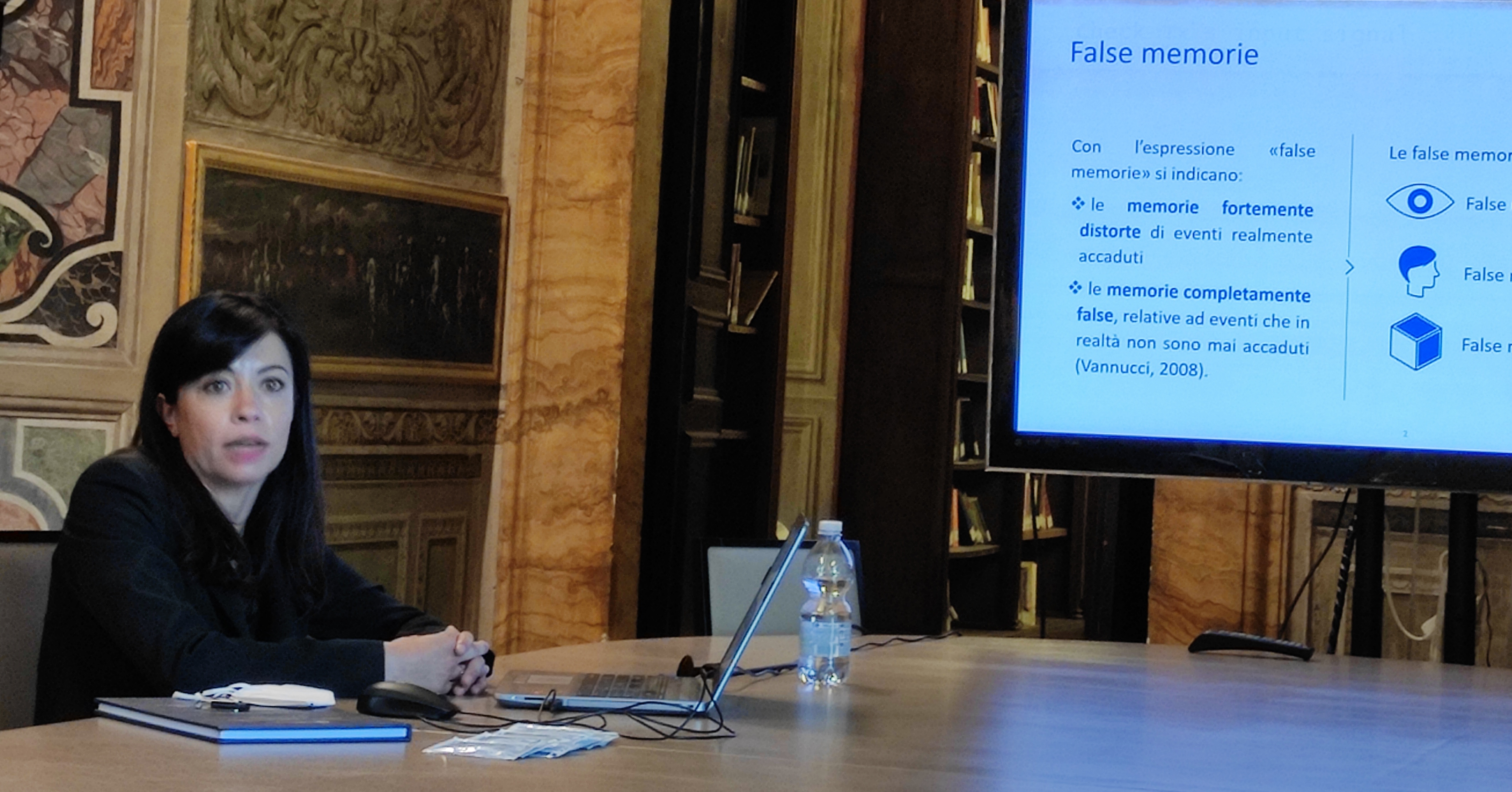| News on Neurodevelopmental Disorders & Addiction |
LATEST SCIENTIFIC DISCOVERIES, about ADDICTION and OTHER NEURO-DEVELOPMENTAL SYNDROMES:EMMA is committed to divulge and to highlight discoveries on new therapeutic tools for disease of mind & metabolism (e.g., depression, mood disorders, psychoses, mental retardation, etc.) - BROWSE the section using "Prev" and "Next" buttons at footer of pages.|
12-june-2023 |
|||||
| |
|
 ---
--- ---
--- ---
--- ---
--- ---
--- ---
---
This paper has been made possible by the continued efforts of the following Bac students (Faculty of Psychology, University Uninettuno, Rome), which appear as coauthors and are here acknowledged in reverse order of their Degree date.
Ileana MANGILI; (UTIU, July 2022)

Ileana MANGILI, on 6 July 2022
- I. MANGILI wrote and discussed a Thesis on anomalous memories. About the paper, she prepared the Introduction and the Abstract as well as contributed to Discussion and helped to respond on referees' comments, after submitting at various journals.
Roberta D'ANGIO'; Daniela ORLANDO; (UTIU, March 2022)


Up to Down : Daniela ORLANDO & Roberta D'ANGIO' on 8 march 2022
- D. ORLANDO wrote and discussed a Thesis on life-experiences od ADHD women; about the paper, she helped with data handling, pre- and post- processing, until preparation of figure(s).
- R. D'ANGIO' wrote and discussed a Thesis on GAMBLING\OCD and akrasia; about the paper, she was crucial on-the-field in managing the Pedigree Tables for a correct breeding strategy !
Sara ALBANESE; Anna Sara LIBERATI (UTIU, February 2021)


Up to Down: Anna Sara LIBERATI & Sara ALBANESE on 9 February 2021
A.S. LIBERATI wrote and discussed a Thesis on criminal Psychopathies and violent aggressivity; about the paper, she was crucial in preparing the taxonomy and genealogy trees for DAT hetero-zygous rats, issuing from all possible combinations of genotypes for their parents. The construct that PAT males bred with MAT females yield GIX pups and PAT females bred with MAT males yield DIX pups, was solely constructed thanks to her own contribution.
- S. ALBANESE wrote and discussed a Thesis on Autism and its environment; about the paper, she was crucial in the original and empirical observations about maternal behavior, on MAT females caring for GIX pups and on PAT females caring for DIX pups, allowing the discovery that not all heterozygous are equal one to another!!!
Disordered gambling is a major societal problem with high costs to the subjects involved. Animal models may help in understanding and preventing gambling-related problems. Data show that some (lab) animals may have gambling-like profiles, yet we need few additional steps towards models of disordered gambling. Read all
Wednesday, October 29, 2014 | Featured Article
Rats switch to random mode when up against hard-to-beat competitors, and we should too
A study on rats, published in the journal Cell ...
Oxytocin promotes group-serving dishonesty, by Shaul Shalvi and Carsten K.W. De Dreu : Full Text or PDF
Read discoveries on Schizophrenia and Mental Retardation : unespected links ...
|
Adolescence appears to be a period of heightened propensity to develop addictions but the biological factors that increased vulnerability were not known. New research carried out in rats and published in the Journal of Neuroscience provides important clues. Relative to adults, adolescent rats took cocaine more readily, were more sensitive to lower doses, showed greater escalation of cocaine intake, and were less susceptible to increases in work they had to do to get the drug.
Adolescent rats also showed increased activity of dopamine neurons, a feature known to be associated with increased drug self-administration behaviour. Dopamine is essential or drug-induced reward. The results highlight behavioural and biological markers of heightened addiction liability during adolescence
Wong et al. (2013) Adolescents Are More Vulnerable to Cocaine Addiction: Behavioral and Electrophysiological Evidence. The Journal of Neuroscience, 33: 4913-4922
Anselme P (2010 - link to DOI). The uncertainty processing theory of motivation. Behav Brain Res. 208: 291-310. Epub 2009 Dec 23.
Paper just published in Neuroscience & Neuroeconomics about economic decision making - attractive effects of immediate reward and reward-cues (i.e., TEMPTATION) GO & READ
A Neuroeconomic Theory of Bidirectional Synaptic Plasticity and Addiction (2010) Med Hypotheses, 75: 356-358
Taiki Takahashi
proposes, in this paper, a possible link between economic theory of addiction (Becker and Murphy, 1988) and neurobiological theory of bidirectional synaptic plasticity (Bienenstock, Cooper, Munro, 1982).Evaluation of animal models of neuro-behavioral disorders. By van der Staay FJ, Arndt SS, Nordquist RE. Behav Brain Funct. 2009 ; 5:11.
The effect of 5-HTT gene promoter polymorphism on impulsivity depends on family relations ...
| < Prev | Next > |
|---|
How many online?
We have 1 guest onlineEvents and Links
| Meetings & Congresses |
|
Index of Congresses ... –Forthcoming- the 13th Dresden Symposium on Autoantibodies in September 2017 |
|
| Read more... |
| Debates & Lessons |
|
User Access: LOGIN  Beyond science: philosophy, mind and metabolism: 1) Genes, but ...NOT ONLY... 2) Latest hints on innovation: "ALTERNATIVE MEDICINES" 3) The burden of ADHD on modern society (families, health systems). |
|
| Read more... |
| Societies, Journals (to visit) |
 Science Societies, Science Journals. Associations to help people with a psychiatric disease (and their families). |
|
| Read more... |
Area Bio-Medical Research Interface between Industry and Academia
Area Clinical Research and Care: Interaction of Physicians and Patients
Area Teaching/ Dissemination of Biomedical Culture
Sondage
Current Activities
| Ongoing Research Activity |
| Planned Grant Applications |
| Published to be read! |
Meet us
| We Recommend You To Come To Our Congress |
| How To Reach Our Site, Congress Fees |
| Special Symposia (page for Members & Partners) |
Announcement on interesting news
| Websites of Consortia |
| Fellowships / awards for PhD students / post-docs |
| News via RSS Feed |



